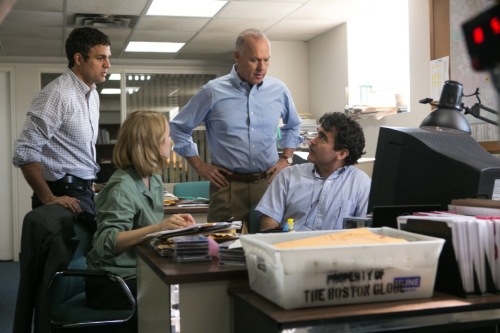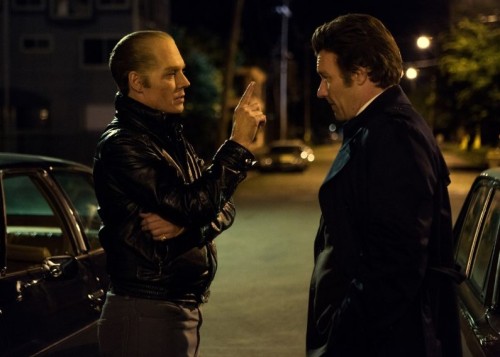
The greatness in “Spotlight” comes from its simplicity. Nothing about it is flashy. There are no huge sets, no cast of thousands. Neither the music nor the cinematography is in your face. The costumes and post-production edits never draw attention to themselves.
By taking all the “movie” elements out of the focus, the actual spotlight of the film lands on the two most important components: the story and all the people in it.
With a subject as serious as sexual abuse in a religious setting, the filmmakers had to make sure this story was told right, told fair and told with purpose, just as the real journalists had to 15 years ago. The Academy Award-winning screenplay and the performances by the amazing actors proved that this is not only a perfectly made film, but an important one, too.
In 2001, the new editor of The Boston Globe, Marty Baron, assigns a team of journalists to investigate allegations against John Geoghan, an unfrocked priest accused of molesting more than 80 kids.
Led by Spotlight editor Walter “Robby” Robinson (played by Michael Keaton), reporters Mike Rezendes (played by Mark Ruffalo), Matt Carroll (played by Brian d’Arcy James) and Sacha Pfeiffer (played by Rachel McAdams) interview survivors and plead the courts the release of sensitive documents connected to the case.
After several months of interviews, the reporters discover an even bigger story surrounding more than 70 accused priests. They make it their mission to provide proof of a sex-abuse cover-up within the Catholic Church throughout the Boston archdiocese.
First and foremost, the actors deserve all the praise they’ve earned and more for their portrayals of all the real people in this movie. As much as new-editor Baron—portrayed by Liev Schreiber who plays Baron as a tough professional that knows the truth is what matters most—wants the Spotlight team to investigate the story, many of the reporters and their editor have reservations about doing the story.
Robby Robinson, a native Bostonian and long-time Boston journalist, is skeptical about the team tackling the story, unsure about their chances of winning over the Globe’s readers, most of whom are Irish-Catholic. He spends most of the two-hour runtime convincing his reporters to hold back what they have until every last angle of the story is covered right.
But the rest of the investigative team’s determination sells the story’s importance and timeliness. As Rezendes (Ruffalo’s character) says in the final act of the movie, “They knew and they let it happen… It could have been you, it could have been me, it could have been any of us.”
And that may be the scariest part. Every actor is portraying a real person, not only film’s stars, which include Stanley Tucci and John Slattery. Many of the real people knew about what happened and either didn’t or couldn’t say anything to the authorities. Handling these key scenes and doing with both victims’ and reporters’ feelings in mind was huge and right.
For a movie that takes place in Boston, the actors’ accents are jarring because they aren’t typical caricatured Boston accents. They’re actually much subtler and harder to pin down, which can be distracting. But after 20 minutes of movie, the story is so engaging that the way anyone sounds doesn’t even matter.
Even though the technical side of the film doesn’t draw attention to itself, the filmmaking is done smartly and effectively, and it will most likely go unnoticed unless looked for. In the first act, nearly every shot of a conversation is done from a distance and over the shoulder with someone’s head or shoulder out of focus in the foreground. By shooting this way, the viewer’s point of view is as an outsider who’s just observing.
But once the meat of the story is explored—and discussions and interviews become more personal—the camera is right in the action. Everyone is fully in frame together, and over-the-shoulder close-ups don’t show the other actors. Now the characters are talking directly with and to the audience.
In order to keep these key moments real, no music is played. The score is minimal throughout, always slower, steadier and quieter. When it does appear, it’s only for transitions when the story changes time and setting, eventually becoming the audience’s cue that the story is moving forward. But when something factual is happening in real-time, the silence is golden.
Although the story is about the church, many lawyers and editors tell the reporters to refer to it as the “Institution,” which is perfect for the film’s basic conflict: the Institution versus the Truth. When the church and lawyers become allies in trying to keep the scandal out of the public’s eyes, the two almost become inseparable, making it harder to take them down. In this way, it’s really an underdog story where the truth and truth tellers have an uphill struggle the whole way.
During almost every investigation or interview scene or sequence, there is a church in the background. Whether it’s talking to victims, lawyers and priests or just sitting outside the courthouse, there’s nearly always a church nearby. Because the church is synonymous with the institution, it’s as if Big Brother is always watching and the Spotlight team can’t escape its influence, making their struggle all the more difficult.
As a journalist, this is my kind of superhero movie. Just as with “All the President’s Men,” getting to the truth and telling the real story is what it’s all about. With something as important as this story, the men and women who brought it to light are heroes. And the men and women who brought it to the silver screen are heroes, too.

